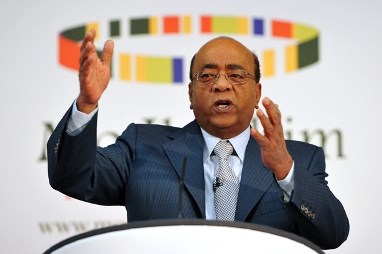Mo Ibrahim prize for good governance in Africa fails to find winner
October 15, 2013 (KHARTOUM) – A prize established by Sudanese-born telecom magnate Mo Ibrahim and awarded annually for good governance in Africa has failed to find a winner for the fourth time..

Founded in 2007, the Ibrahim Prize for Achievement in African Leadership recognises democratically elected leaders who have developed their countries and improved living standards for their people.
The UK-based entrepreneur launched the prize in an attempt to encourage African leaders to improve governance and leave power peacefully.
He has defended the committee’s decision not to award this year’s prize, saying he was not prepared to compromise on the criteria of excellence required.
“It’s a prize for excellence, and excellence by nature is rare”, Ibrahim told AFP.
“No compromises! This is a prize for people who inspire, who really change the course of their nation”, he added.
In addition to the initial $5 million prize paid over 10 years, recipients from then on receive $200,000 annually for life, with a further $200,000 per year available for philanthropic activities the winner wishes to pursue.
Under the criteria, only leaders who have left office in the last three years quality for the award, which also stipulates that the winner be democratically elected and have left office voluntarily after serving their constitutionally mandated term.
Past winners include former South African president Nelson Mandela, Joaquim Chissano of Mozambique, Festus Mogae of Botswana and Pedro Pires of Cape Verde.
AFRICAN DIVIDE GROWS
In conjunction with the award, the foundation on Monday published its annual Ibrahim Index of African Governance (IIAG).
Fifty-two African countries are included in the IIAG, which provides the most comprehensive collection of quantitative data on governance in Africa.
Countries are assessed according to 94 indicators grouped under Human development, sustainable economic opportunity, participation and human rights and safety and rule of law.
Tiny Mauritius topped the index as the best governing country in Africa, with Somalia ranking at the opposite end of the scale in last place.
Botswana and Cape Verde rounded out the top three spots, while Chad, Central African Republic (CAR), Eritrea and Democratic Republic of Congo made up the bottom five.
The ranking doesn’t include Ibrahim’s native Sudan, or new nation South Sudan due to a lack of comprehensive data.
Ibrahim noted that the latest index showed both positive and negative trends across the continent.
He said 94 percent of Africa’s population now live in countries which have recorded an overall improvement in governance since 2000, with 18 of the 52 nations surveyed earning their best scores ever.
However, the results show a widening gap in performance between the best and worst governed countries.
“The continental average of 51.6 for overall governance conceals the widening span in performance between the African countries, with the top performing country, Mauritius, scoring 82.9 while Somalia, the poorest performing country, registers the lowest country score at 8.0”, the foundation said in a statement on Monday.
In a worrying trend, safety and rule of law have also declined, signalling a shift toward domestic social unrest, which is particularly evident in countries at the lower end of the index.
“Neither Afro-pessimism nor Afro-optimism do justice to modern Africa. This is now the age of Afro-realism – an honest outlook on our continent. It’s about a celebration of its achievements but also a pragmatic acknowledgement of the challenges that lie ahead”, Ibrahim said in the statement.
Ibrahim set up the Mo Ibrahim Foundation shortly after selling his telecommunications company Celtel in 2005 for $3.4 billion.
The billionaire tycoon, who was ranked the 692nd richest person in the world by Forbes magazine in 2011, has pledged to give away at least half of his wealth to charity.
(ST)
